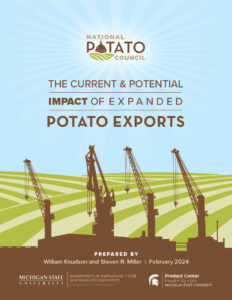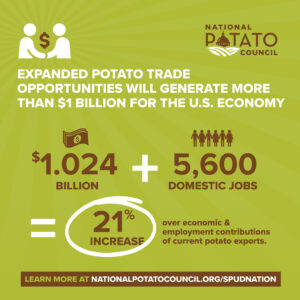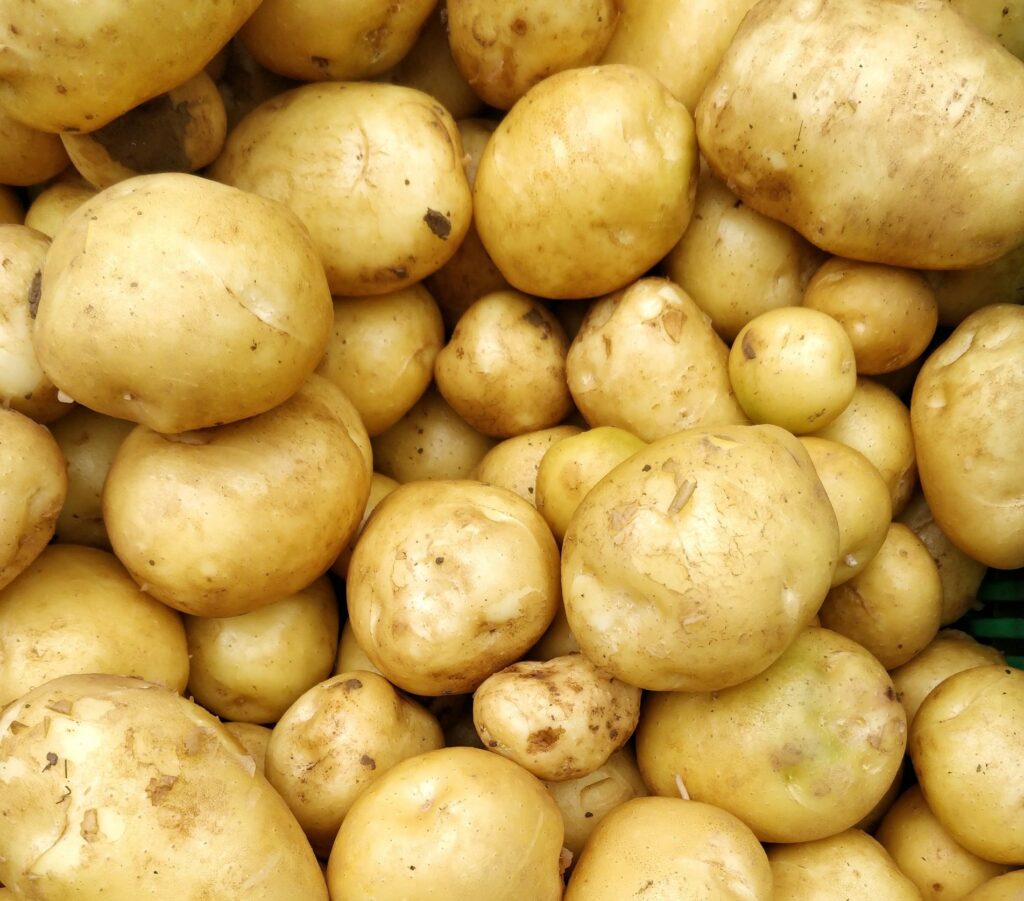Feb 26, 2024Report: Expanded market access would spur additional $1B in economic activity
A new report detailing the economic impact of the U.S. potato industry emphasizes the importance of expanding exports, finding that “moderate and achievable” expansions in foreign markets would generate an additional $1 billion in economic activity.
“The Current and Potential Impact of Expanded Potato Exports,” authored by economists at Michigan State University and released Feb. 26 by the National Potato Council, also found that expanded foreign market access would support 5,600 more U.S. jobs.
 NPC CEO Kam Quarles joined incoming NPC president Bob Mattive, outgoing NPC president RJ Andrus and Ted Tschirky, NPC vice president of trade, to discuss the findings in a media conference call on Monday.
NPC CEO Kam Quarles joined incoming NPC president Bob Mattive, outgoing NPC president RJ Andrus and Ted Tschirky, NPC vice president of trade, to discuss the findings in a media conference call on Monday.
The study, released one year after an MSU analysis measuring potatoes’ impact on the U.S. economy, “will serve as a new tool in our toolbox to advocate for our long-standing policy priority, which is expanding foreign market access for U.S. potatoes,” Quarles said on the call.
The report’s findings will be presented during the 2024 NPC Washington Summit, which began Monday.
Current exports of U.S. potatoes and potato products generate around $4.78 billion in economic activity and support nearly 34,000 domestic jobs, according to the report. Mattive highlighted the noted $2.2 billion in U.S. exports of potatoes and potato products from July 2022-June 2023.
“That economic activity didn’t just benefit potato growers but also farm laborers, process workers, truck drivers, longshoremen and the communities that they live in,” Mattive, also a Colorado potato grower, said Monday. “All benefited from trade of U.S. potatoes.”
 Approximately 20% of all U.S. grown potatoes are exported, according to the report, which analyzed variable expanded market scenarios. Those included a 10% increase in exports to Canada, Japan and South Korea; a 25% increase in exports to other East Asia markets, Mexico and selected countries in the Middle East; and an additional $100 million in U.S. fresh potato exports to Mexico and Japan.
Approximately 20% of all U.S. grown potatoes are exported, according to the report, which analyzed variable expanded market scenarios. Those included a 10% increase in exports to Canada, Japan and South Korea; a 25% increase in exports to other East Asia markets, Mexico and selected countries in the Middle East; and an additional $100 million in U.S. fresh potato exports to Mexico and Japan.
Andrus outlined barriers to U.S. exports, including tariffs, quotas and sanitary and phytosanitary barriers.
“Two years ago, we overcame these barriers to achieve full market access for U.S. fresh potato trade to Mexico,” he said. “As a result, we’ve seen exports increase by more than $100 million, and we believe the market has additional room for growth. We’re now working to achieve the same access to Japan for U.S. potatoes.”
‘Massive’ Japanese market
A Japanese market fully open to U.S. fresh potato, or table stock, exports would become “a massive new market,” Andrus said, estimated at $150 million-$200 million annually.
The U.S. has been able to export potatoes for processing and a limited amount of chipped potatoes to Japan since 2006, but nearly 30 years of discussions on table stock access have bogged down in a phytosanitary debate that includes the ironing out of a pest risk assessment.
There has been little progress in those negotiations, said Quarles, with bilateral plant health meetings in Japan last fall not producing anticipated movement.

“They have a small but very politically active domestic industry,” Quarles said Monday. “They import no fresh table stock potatoes from anywhere right now, and clearly their industry likely doesn’t want to change that too much. … The Japanese government has just kind of dug their heels in. It’s a big stalling exercise right now by the Japanese, and we’re trying to pry that open.”
The fight is similar to the struggle encountered in the Mexican market, which fully opened to U.S. fresh potatoes in May 2023. The country is the top destination for U.S. potato exports, accounting for $111 million in exports in 2022-23, and the USDA’s Animal and Plant Health Inspection Service estimates full access will provide a market potential of $250 million per year in five years.
Quarles said it’s “entirely reasonable” for a country to have “a set of robust protections for their domestic industry.”
“Too often, though, the challenge comes from, you’re not talking about reasonable mitigation,” he said. “You’re talking about countries utilizing pest and disease excuses as reasons not to negotiate, not to open their markets, not to consider the possibility of foreign imports.”
— Melinda Waldrop, managing editor








